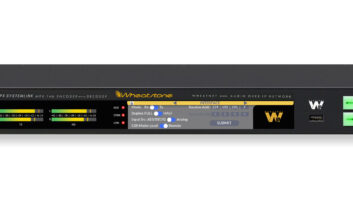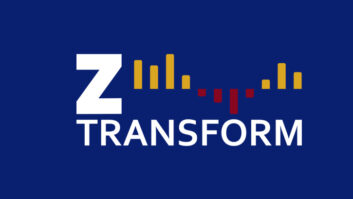Demand for Non-Traditional Advertising Drives Growth of In-Store ‘Radio’ Services
NEW YORK While the concept of an in-store audio business – music or messages broadcast over a store’s sound system – is nothing new, the mechanics behind today’s version is novel.
Grocery stores have piped in music at least since the 1950s, but nearly gone are the days of looped music and canned messages, some so generic they could play in any store in any city.
Today’s proliferation of new technology gives retail audio networks the ability to offer high levels of customization, with some companies even pitching their services as “in-house” radio stations. These services also give advertisers another platform to place ads that can reach shoppers who are already in-store and ready to buy.
Venerable names such as Muzak, DMX Music and Music Choice still provide retail music services. But they face stiffer competition from companies that are offering sophisticated solutions to customers by delivering programming over the Internet rather than via satellite or FM subcarrier. Even Sirius Satellite Radio and XM Satellite Radio offer business music.
Retail audio suppliers say music helps businesses connect with customers and can even increase employee productivity. More important, they say in-store audio can help drive sales through messages aimed at people who are already at the point of purchase and help to defray system costs through advertising.
Distinct store identity
The “Arbitron Retail Media Study” in 2005 reviewed America’s awareness of retail audio broadcasting and the advertising it carries. While the most comprehensive analysis to date looked specifically at the value of retail audio in grocery stores and drugstores, many types of businesses view in-store audio as essential in creating a distinct identity for their stores.
“Customization is the one word we hear a lot. Retailers are beginning to think about forming networks of all their stores linked together. It is definitely becoming a more managed thing. It’s clear that retail audio broadcasting as a national advertising vehicle is becoming is effective and becoming more effective,” said Diane Williams, project manager for Arbitron’s custom research business.
Parties interested in audience measurement of in-store advertising approached Arbitron about conducting the study, Williams said, to help determine how receptive Americans are to storecasting.
Americans “seem to like advertising if it is geared towards their interest at a specific time. More than 40 percent say they have made a purchase they were not planning on making after hearing a retail audio commercial or promotional announcement,” Williams said, “while 57 percent of Americans believe it is an acceptable form of advertising.”
It’s that “point-of-purchase” immediacy that has caught the interest of in-store radio providers and media buyers, Williams added.
“Media buyers are starting to look at these in-store networks when they plan out their buys,” she said, noting that Proctor & Gamble Co. and Unilever have both stated they plan on spending more ad dollars on at-retail marketing.
The Arbitron report concluded, “As Americans spend more time with nontraditional media, it becomes important [for advertisers] to utilize media that can put the advertising message in the ‘window of opportunity preceding each purchase.'”
Rich Balsbaugh, CEO and president of Pyramid Radio Inc., an in-store audio network provider, said in-store radio is moving quickly from a background service to the foreground.
“In my opinion, some of the services were missing the boat. This industry needed more foreground music with personality and creativity. We have created a personalized in-store radio station with music, messaging and commercials. It’s really about branding for each client,” Balsbaugh said. “We bring their branding in-house with their own radio network.”
Satellite delivery
Balsbaugh, who owned Pyramid Communications before selling his 16 radio stations to Evergreen Media in 1996, says his new company’s focus is on customization.
“We program it so that when a customer comes in the store we want it to sound like a radio station was built specifically for that store. Our networks do play commercials, either in-store vendors who want to affect point-of-purchase or even outside ads that do not conflict with in-store items, ” Balsbaugh said.
Pyramid Radio Inc. was launched in 2005; it has a strategic alliance with Muzak for content delivery via satellite, Balsbaugh said. “They handle the receiver installation and deliver our programming. We provide the content.”
A number of different packages are available to big-box retailers, Balsbaugh said, with Pyramid Radio becoming the “voice of the store” and offering compelling radio.
“This is a very high-growth area to the companies that can truly do things in a quality way … not cookie-cutter stuff. This is very creative stuff. I’m talking real quality broadcasting with very good talent,” Balsbaugh said.
Meanwhile, Muzak is still fighting the “elevator music” stigma that came from establishing a whole genre of music known as “elevator music.” Today the company offers 80 music programs and custom channels and estimates it is heard in about 60 percent of the U.S. businesses that subscribe to music programming, according to the company’s Web site.
Calls to Muzak seeking comment for this story were not returned.
At OMT Technologies, Marieke Wijtkamp, president and chief operating officer, said the company’s Intertain Media Inc. division hopes to launch its retail radio music service in the United States later this year. It already offers its customized in-store Galaxie Music for Business programming in Canada.
“We see this as a very high-growth area for us. Everyone is trying to do more with less and certainly technologies that are Internet delivered and readily available are very cost effective,” Wijtkamp said. “Retailers are increasingly looking to enrich their customer’s store experience by creating unique environments.”
Intertain, which focuses exclusively on retail, delivers its programming via IP network protocol and has a private Web site for customers to choose from 100 professionally programmed channels, which can be customized for specific regions or stores. Customers get a “laptop size” audio player that can go “in the back room,” she said.
OMT, known for its iMediaTouch audio management product, entered the business music and message field when it acquired the assets of another company in 2003. It partnered with the Canadian Broadcasting Company to launch Galaxie Music for Business in 2005.
“The CBC provides us content and music and (Intertain) handles all other aspects of selling the service and advertising,” Wijtkamp said.
‘Play space audio’
Jeremy Rosenberg, senior VP of technology for Music Choice, another in-store audio network provider, says mass customization is available to its customers.
“Technology is allowing us to transform the media environment within businesses. It’s allowed us to be more transparent and seamless in what we deliver,” Rosenberg said.
Music Choice takes a slightly different bent than some others in the field. Company execs say the firm excels at long-duration listening. Music Choice specializes in “play space audio” geared for common areas, like malls or office waiting areas, Rosenberg said. It delivers audio content via cable, satellite and IP network technology.
“Technology allows our customers to use the product the way they want and create a specific shopping experience,” Rosenberg said.
Barix Technology Inc., the US-based subsidiary of Switzerland’s Barix AG, offers big-box retailers hardware for their background music needs. The company sells its Extreamer decoder and Instreamer encoder devices. Barix uses standard IP Network infrastructure for content distribution.
“Audio can now be easily delivered to stores via the Internet and also allows for local customized advertisements. Audio can be streamed from one central location to as many store locations as they want,” said Jahannes Rietschel, CEO of Barix AG.
Barix provides only the hardware solution and leaves content development and rights licensing to the clients or other third party services, Rietschel said.
Could broadcasters become more involved in storecasting or focus resources on launching such services? Jeff Littlejohn, executive vice president of distribution development for Clear Channel Radio, said, “We currently do not provide those services. However, it’s something we could do. We have looked at it.”
Clear Channel is part-owner of Muzak, Littlejohn said.












